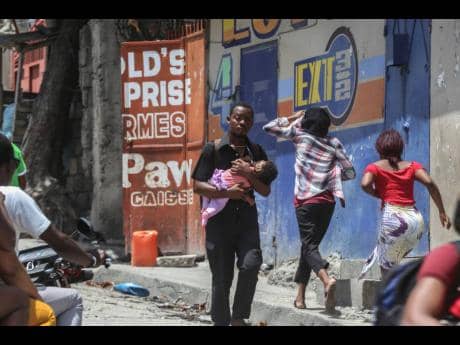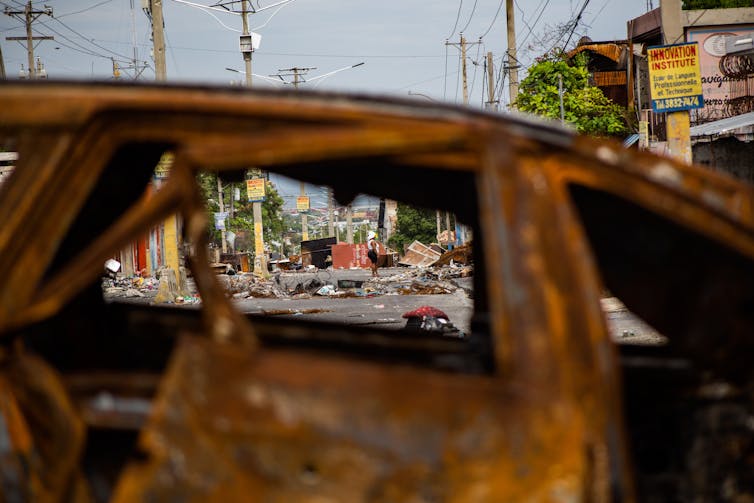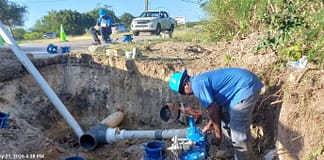
https://theconversation.com/-An advance team of Kenyan special forces police have arrived in the troubled Caribbean nation of Haiti. They are part of a larger UN-backed “support” mission tasked with establishing order, pushing back the advances of criminal gangs and allowing the freshly appointed interim government to function effectively.
In total, around 2,500 officers are expected to join the mission from a host of nations, including the Bahamas, Jamaica, Guyana, Barbados, Antigua and Barbuda, Bangladesh, Benin and Chad. This multinational police force will do the heavy lifting on the ground. But the bulk of the money to see the mission through will come from the US.
It is a noble initiative aimed at rescuing what many regard a failed state. However, there is plenty of scepticism surrounding the efficacy of this mission, not least from many Kenyans and Haitians who are not particularly enthusiastic about it.
External intervention has become a recurring event in contemporary international society. It has been undertaken in several contexts under the guise of “humanitarianism” for the purpose of protecting lives, establishing order in a conflict-ridden society and giving a new lease of life to a state that is failing in its primary function
However, intervention in another country’s affairs is a double-edged sword. There exists an established body of literature that argues foreign military interventions have not always been helpful or advantageous for the country on whose behalf it is undertaken. In fact, in some situations, it can do more harm than good.
There are two reasons for this. First, any form of intervention, military or otherwise, undermines a nation’s sovereignty. And second, if the core objective of the intervention is not fulfilled by the intervener, it may compound the anger of those on whose behalf it was undertaken.
Yet another foreign intervention
This Kenyan-led mission will not be the first to intervene in Haiti’s internal affairs. Haitians have experienced two other external military interventions in the last 30 years. But each intervention has done precious little.
In 1994, the US sent 20,000 troops to join a UN peacekeeping force in Haiti in an operation to return Haiti’s first democratically elected president, Jean-Bertrand Aristide, to power after a coup. Then, after Aristide was again forced from power in 2004, troops from the UN Stabilisation Mission in Haiti served in the country until 2017.

As part of a nation that was borne out of a slave revolt in 1791, Haitians of all walks of life have always reviled external interventions in their country. However, that sentiment has hardened in recent years following horrifying experiences with external forces trying to be “do-gooders”.
In 2005, Brazilian troops conducted a “pacification” operation in Cité Soleil, the largest slum of the Haitian capital, Port-au-Prince. The troops in question were responding to reports of a disturbance in the slum when they were confronted by irate residents.
They responded with violence. According to witnesses, the troops murdered 63 people and wounded another 30. That grief is still raw in Haitian memory.
This grief was compounded in 2010 when a contingent of UN peacekeepers accidentally released contaminated water from their camp into local waterways. A cholera outbreak followed, leading to the deaths of up to 30,000 people.
During that same period, a number of UN blue berets from Brazil and Nepal were found to have raped women and girls, or sexually exploited them in exchange for food or support.
A report produced by the Associated Press in 2017 revealed that, despite repeated denials by the UN, 114 of its peacekeepers ran a child sex ring in Haiti over a ten-year period and were never punished for their sordid sexual violence.
Given the enormity of these abuses in the hands of those who were meant to keep them from harm’s way, many in the country feel that past external interventions made life worse. Little wonder some in the country consider any talk of outsiders addressing the plight of Haitians as patently hypocritical.

The reason why many outside of Haiti are hopeful that Kenyan intervention can succeed where others have failed is based on an unspoken racial assumption. Given the scandalous UN peacekeeping operations and tainted military US interventions in the past, it is assumed that the current mission will have a natural legitimacy, be less contentious and enjoy a bigger chance of success, if there is a racial similarity.
The racial aspect of “humanitarian intervention” has perhaps been best highlighted by former Kenyan foreign minister, Alfred Mutua. When asked in August 2023 about the reason behind possible Kenyan intervention in Haiti, he said: “Kenya stands with persons of African descent across the world.”
Putting aside the racial dimension, the chances of the latest mission’s success is far from assured. There are currently an estimated 200 gangs operating across Haiti, and membership of gangs runs into the tens of thousands. They have a stranglehold on the country’s infrastructure, and they have driven hundreds of thousands of people from Port-au-Prince.
Haiti’s armed gangs are the country’s real power brokers, with partners in politics and the private sector. Making them give up their lucrative operations in this broken country by way of a token 2,500 foreign police officers will probably be asking too much.
Advertise with the mоѕt vіѕіtеd nеwѕ ѕіtе іn Antigua!
We offer fully customizable and flexible digital marketing packages.
Contact us at [email protected]
















By all means help Haiti 🇭🇹, but Antigua has a growing problem with rising criminal activities and gun crimes; and who else like me have noticed that a few smaller stores are no longer open here due to this crime wave?
Prime Minister resolve our own issues, because charity begins at home first …
I wholeheartedly agreed with Brixtonian. The Haitians’ crisis was created by the French and the Americans; therefore, the onus of sorting out the crisis should be on them.
The buffoon PM should commit his son to work by sending him to Haiti as humanitarian gesture. It is inconceivable that the buffoon PM considered it right and proper to send other people’s sons and daughters to Haiti whilst his sons continued living and enjoying a rich lifestyle.
Antiguans and Barbudans let’s stand up against this absurd and crazy intervention of the buffoon and protests against this madness. We should organise peaceful demonstrations as from 27/05/2024 and say no to sending our young men and
women to Haiti.
The intervention is a disaster waiting to happen. What does Kenya knows about Haiti? Kenya has not managed to stop the escalation of terrorist groups operating within Kenya.
It is time for Antiguans and Barbudans to do the right thing by signalling to this disastrous administration that we as a nation will no longer tolerate reckless and out of control decisions by the buffoon which will have dire consequences.
Comments are closed.